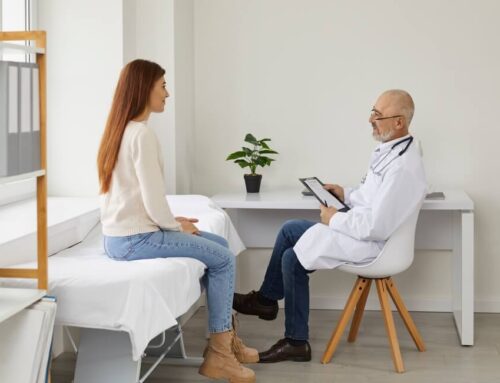Emergency contraception refers to the options available to decrease the likelihood of pregnancy after unprotected intercourse. While many assume that emergency contraception just refers to “the morning-after pill,” there are actually several different types that will be discussed.
Emergency contraception can be used when a person’s typical method of birth control fails, such as a condom breaking or if no contraception was used at all. Emergency contraception comes in two forms: emergency contraceptive pills (ECP) and intrauterine devices (IUDs).
It is crucial for individuals to understand the facts about emergency contraception so they can make informed decisions about their reproductive health. In this article, experts at New Age Women’s Health will discuss how emergency contraception works, the different types, when to use it, its effectiveness, and potential side effects. Additionally, we will cover important information on accessibility, cost, and alternative options.
How Does Emergency Contraception Work?

Emergency contraception works by preventing or delaying ovulation or the release of an egg from the ovary. The two types of emergency contraception available are emergency contraceptive pills (ECPs) and intrauterine devices (IUDs).
There are several types of emergency contraceptive pills, but we will focus on two main ones in this article. One type is Plan B (or Plan B One-Step), and another is Ella (or EllaOne). Plan B is more commonly referred to as “the morning-after pill.”
Plan B is effective during the first 72 hours after unprotected sex as pregnancy prevention. It contains a high dose of the hormone progestin, which stops or delays ovulation. The ECP can also prevent fertilization by thickening the cervical mucus, making it difficult for sperm to reach the egg. It is important to know that it is more effective the sooner that it is used. Possibly more importantly, Plan B is available without a prescription over-the-counter at local pharmacies and places such as Target, Walgreens, CVS, etc. You do not need to call or speak with your doctor prior to purchasing Plan B.
Intrauterine devices, or IUDs, are small, T-shaped devices that are inserted into the uterus by a healthcare provider. They can be inserted within the 5-day window following unprotected sex and can remain in place for up to several years as a long-term form of contraception. The copper IUD releases copper ions, which creates a hostile environment for sperm, preventing fertilization. It can also prevent a fertilized egg from implanting in the uterus. Hormonal IUDs thicken cervical mucus and prevent ovulation, making it more difficult for an egg and sperm to meet.
Keep in mind that emergency contraception is in no way an abortion tool, and it will not work if a person is already pregnant. Additionally, emergency contraception is not as effective as regular birth control methods such as hormonal birth control pills, IUDs, or condoms. It should not be used as a standard method of contraception.
Ella (or EllaOne)
EllaOne is a type of emergency contraceptive pill (ECP) that can prevent pregnancy after unprotected intercourse. It contains ulipristal acetate, a synthetic hormone that acts as a progesterone receptor modulator. It works by stopping or postponing ovulation (the ovary releasing the egg), making it harder for sperm to fertilize an egg.
EllaOne can be taken up to 120 hours after engaging in unprotected sex, which is longer than the 72-hour window for most other ECPs, including Plan B. This makes it a more effective option for people who have missed the 72-hour window for other ECPs. It has a success rate of about 95% when taken in the first 24 hours after unprotected sex and about 85% when taken between 25 and 48 hours.
EllaOne is available by prescription from a healthcare provider and can be taken at home. It is important to note that EllaOne should not be used as a regular birth control method; it is intended for emergencies only.
Some common EllaOne emergency pill side effects include nausea, headaches, and menstrual changes.
It is important to note that EllaOne does not protect against sexually transmitted infections (STIs), and it will not work if a person is already pregnant. It is best to use a barrier method of contraception, such as condoms, in addition to emergency contraception to reduce the risk of STIs.
Who Can Use the Emergency Pill?
Emergency contraceptive pills (ECPs) are a safe and effective option for people who have had unprotected sex or whose standard method of contraception has failed. It can be used by people of all ages who can become pregnant.
Keep in mind that emergency contraception is not recommended for people who are already pregnant, as it will not terminate an existing pregnancy. Additionally, people with certain health conditions or taking certain medications should consult with a healthcare provider before using emergency contraception. For example, people with a history of blood clots or taking certain meds, such as anticoagulants, should not use ECPs.
Emergency contraceptive pills are available over the counter in some countries and by prescription in others. In some places, there are age limits, and people under a certain age may need a prescription or parental consent to obtain it. Check with a local healthcare provider or pharmacy for information on accessibility and regulations.
Please note that emergency contraception is not as effective as traditional birth control methods, such as hormonal birth control pills, IUDs, or condoms. Therefore, it should not be used as a regular contraception method, and it is recommended to speak with a healthcare provider to discuss the most appropriate birth control plan for an individual.
Who Can Use the Intrauterine Device?
The IUD is a safe and effective option for people who have had unprotected sex or whose regular method of contraception has failed. However, just like ECPs, it is not recommended for people who are already pregnant, as it will not terminate an existing pregnancy. Additionally, people with certain health conditions or who have had certain types of surgery should consult a healthcare provider before using an IUD. For example, patients with ongoing pelvic infections, certain uterine anomalies or abnormalities, or other rare medical conditions may not be candidates for IUDs.
The IUD is a good option for people who want long-term birth control and a method that does not require daily attention.
As mentioned, IUDs do not protect against sexually transmitted infections (STIs). It is also important to schedule regular check-ups with a healthcare provider to monitor the position of the IUD and to ensure it is still in place.
Where Can You Get Emergency Contraception?

Emergency contraception can be obtained from a variety of sources. The availability and accessibility of emergency contraception vary depending on the country, state, or region.
First, remember that Plan B is generally available over the counter and does not require a doctor’s visit or prescription. If Plan B is not available to you in this way where you live, you can obtain emergency contraception from a healthcare provider. This can include a primary care physician, gynecologist, or reproductive health clinic. A healthcare provider can prescribe the ECP or insert the IUD. They can also provide information about the effectiveness, potential emergency pill side effects, and possible interactions with other medications.
Another place to get emergency contraception is a pharmacy. In some countries, certain emergency contraceptive pills are available over the counter, and a prescription is unnecessary.
Some organizations, such as family planning clinics and non-profit organizations, provide emergency contraception at low or no cost. In some places, emergency contraception can also be obtained from school-based health centers, college health centers, or youth clinics.
Get in Touch Today
If you are interested in long-term birth control, wish to discuss the best option for your individual needs, or require an emergency contraception solution, do not hesitate to reach out to us and schedule your appointment.





